Snapshot of sustainable practices being carried out by Irish retailers
11 November 2014
We have compiled an overview of the types of initiatives being carried out by Ireland’s big five retailers, which also includes some of their corporate social responsibility drives
SUPERVALU/MUSGRAVE
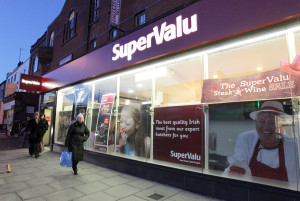
Superquinn’s addition to the Musgrave team in 2012 put a spike in the pollution and emissions of the company
As a part of achieving its sustainability objectives, Musgrave has been making substantial changes to the way that it runs its business.
• Musgrave has added double decks to its shipping vehicles, increasing their carrying load by 58% each trip.
• The company has also reduced the distance that its food is transported; in so doing they are helping to support local producers, provide fresher foods, and minimise their environmental impact due to transportation.
• All Musgrave facilities in Ireland are supplied with 100% green electricity.
• Despite the business growing by 50% over the last seven years, Musgrave has decreased its carbon footprint by 45%.
• Recycling rates last year were also up to 95%, which was up from 83% in 2012.
• In 2013, the overall footprint left by Musgrave was reduced by 13.9% equaling approximately 6,373 tonnes of CO2. Over seven years, Musgrave has achieved a 91% reduction in waste sent to landfill, resulting in a cost avoidance of €3 million.
• Superquinn’s addition to the Musgrave team in 2012 put a spike in the pollution and emissions of the company. The addition of 24 stores that were not up to the same standards as those under Musgrave management took time to be brought up to acceptable standards. The acquisition of Superquinn saw an 8.2% increase in total fleet distances since 2011, but there has been a 1.27% decrease in total emissions and a 4% decrease in emissions per case over the same period.
• Musgrave contributes heavily to charity and community groups with Supervalu, Centra, and Daybreak donating a combined €5.3 million annually.
• Musgrave supports local small businesses by purchasing 100% of its meat exclusively from local producers.
MARKS AND SPENCER
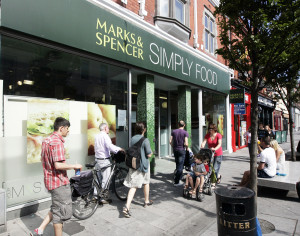
The company has developed a new Plan A programme that consists of 100 new commitments with the goal of becoming the world’s most sustainable retailer by 2020
Marks and Spencer has championed the race for sustainability through its Plan A programme, which was launched in January of 2007 with 100 commitments to achieve over the following five years.
• The company has developed a Plan A programme with the goal of becoming the world’s most sustainable retailer by 2020.
• This programme’s goals include M&S and its joint venture operations achieving zero worldwide carbon emission. Similarly, Plan A involves sending zero operational and construction waste to landfill.
• To achieve carbon neutrality M&S uses renewable electricity sources and high quality carbon offsets to make up for the unavoidable carbon emissions that the business emits.
• The M&S Supplier Exchange Programme informs suppliers about ways to cut down on their carbon footprint.
• M&S was the first major company to join UNICEF’s Cookstove Project, a programme that improves the health and lives of vulnerable children while cutting carbon emissions in developing countries.
• M&S also supports a programme that is working to save the rainforest in Sabah, Malaysia. The Improved Forestry Management Project (IFM) employs 50 people from the local area to assist in rainforest preservation.
• The M&S supported reforestation project in Kenya generates revenue for local communities as well as helps the environment. This programme focuses on cutting down on carbon emissions and preventing ground erosion by planting trees in areas that had previously been deforested.
• M&S is currently helping to promote agricultural biomass power in China. This programme uses organic waste from farms as a renewable electrical energy resource.
DUNNES STORES
• Dunnes was the 2009 winner of Sustainable Energy Ireland’s sustainable energy award, which highlights “excellence in business energy management” and was comprised of over 100 contestants.
• Dunnes managed to win the award largely due to its successful energy reduction programme, which reduced the company’s electricity consumption by 17.4% across 114 stores nationwide.
LIDL
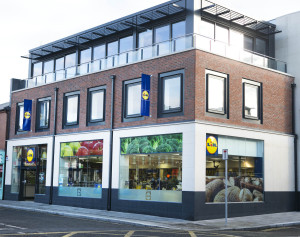 Lidl products have been increasingly stamped with the saying “making the way to a better tomorrow” signifying the products affiliation with sustainable practices.
Lidl products have been increasingly stamped with the saying “making the way to a better tomorrow” signifying the products affiliation with sustainable practices.
• Lidl chocolate bars from the Fin Carre range are UTZ certified with 30% of their chocolate coming from sustainable cocoa sources, which is up from 10% in 2012. By 2020, the Fin Carre range will be 100% cocoa from sustainable and approved sources.
• To help in achieving completely sustainable cocoa, Lidl, with the support of its partner GIZ, finances an agricultural school that teaches its students how to grow more professional, high quality, and most importantly sustainable products.
• Lidl sells UTZ certified cocoa supporting the programme, which works for sustainable coffee, cocoa, and tea. The UTZ programme teaches farmers business management, protection of labour, while still protecting the environment. The programme’s goal is to enable producers to get a better price for their products while still ensuring a healthy environment capable of sustaining production.
• Lidl supports Fairtrade certified producers in Africa, Asia, and Latin America.
• Lidl’s partnership with Fairtrade assists the programme achieve its goal of social and economic development of agricultural communities that are struggling to develop through trade. Fairtrade works in 59 countries with over 7 million people
• Lidl introduced Fairglobe products in its stores to give customers the opportunity to support the producers in these countries, enabling them to improve their standard of living and working conditions.
• Bellarom chocolate in Lidl stores now has 64% sustainable cocoa on each package, making it Rainforest Alliance certified. Rainforest Alliance helps to preserve natural ecosystems through water and soil conservation, reforestation, and educating/training workers and their families.
ALDI
Aldi has been collaborating with Sustainable Fisheries Partnership (SFP) and consulted with other organisations when purchasing fish to make sure that their purchasing policies ensure fishing sustainability.
• Aldi keeps to a strict set of fish purchasing principles to ensure that its fish are lawfully acquired.
• Aldi has also supported sustainable timber sourcing by requiring all Aldi labelled toilet paper, tissue, and kitchen towels be made from recycled material or fibres from well-managed forests certified by the Forestry Stewardship Council (FSC) or Programme for the Endorsement of Forest Certification (PEFC).
• Aldi also requires that none of its label products contain any GMO foods or ingredients.
• The stores offer reusable shopping bags that are recyclable when customers feel the need to retire the bag.
• Aldi is also reformulating washing detergents and fabric conditioners to concentrated versions that require less packaging.
• Furthermore, Aldi is removing unnecessary packaging across all of its products. The company is selling kitchen towels in four roll packs to eliminate the need for cardboard packaging. The more efficient packaging of bulk items cuts down on the number of pallets needed to deliver the same volume of product.
• Aldi is a member of the Roundtable on Sustainable Palm Oil (RSPO), which is a concerted effort to protect climate and rainforests through sustainable palm oil harvests. As a member of the movement to harvest palm oil in a responsible and sustainable manner, Aldi has set the goal of having all of its label food products from Aldi produced with sustainable palm oil by 2015 and non-food products by 2018.
TESCO
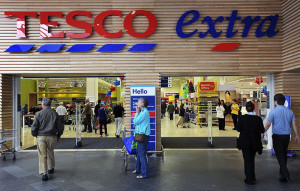
Tesco’s new store in Tramore, Co. Waterford uses 45% less energy than a typical supermarket of similar size due to its progressive structure and design
Tesco has implemented an extensive series of changes and programmes in an attempt to reduce its pollutant footprint. The company has set a series of high reaching goals such as achieving a zero carbon business by the year 2050.
• Tesco is working with suppliers to reduce the emissions embedded in its products by 30% before the year 2020.
• The retailer records its annual carbon footprint by recording the energy use in all of its stores, distribution centres, and offices.
• Tesco also keeps track of the emissions from primary distribution, business travel, and Tesco home shopping delivery vans as well as the impact of HFC gases used for refrigeration.
• Tesco has installed combined heat and power units (CHPs) in its stores to save 656 tonnes of carbon emissions annually.
• Tesco is also using PIR and LED lighting in its facilities as well as motion detector illumination systems to reduce energy consumption. Clerestory lights allow more natural light inside stores, reducing the electric lighting required.
• Tesco uses energy champions, employees appointed to all Tesco stores that monitor energy use, complete energy audits, and provide Tesco staff with energy awareness information. These employees identify steps that can save energy for the store.
• Tesco’s new store in Tramore, Co. Waterford uses 45% less energy than a typical supermarket of a similar size due to its progressive structure and design. It is part of Tesco’s goal to create carbon neutral stores that do not emit any carbon and submit excess energy, produced by solar panels, back to the national grid.
• Newly implemented route scheduling software greatly increases the efficiency of Tesco trucking. New double-deck truck trailers carry approximately 45% more goods, resulting in fewer trips being necessary.
• In 2013 Tesco helped to support the Living Life to the Full programme as a part of its two-year partnership with the charity Aware, which helps those suffering from depression. Living Life to the Full is a six-week programme that teaches skills to manage depression and minimise its impact. The Tesco/Aware partnership is a part of Tesco’s CSR programme.



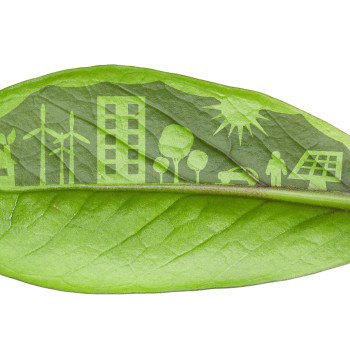
 Print
Print
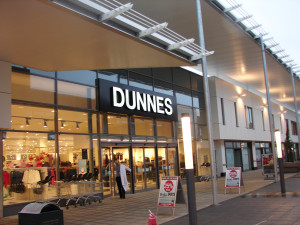
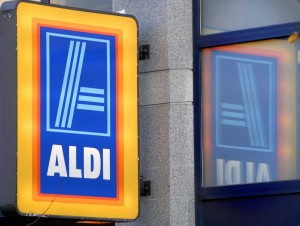


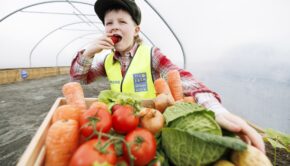

Fans 0
Followers